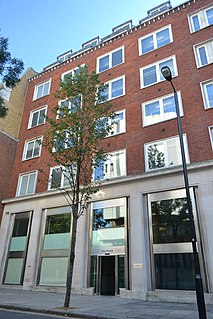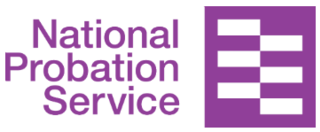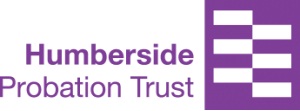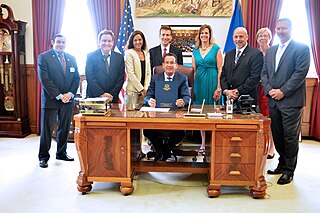Related Research Articles

Penology is a sub-component of criminology that deals with the philosophy and practice of various societies in their attempts to repress criminal activities, and satisfy public opinion via an appropriate treatment regime for persons convicted of criminal offences.

Parole is a form of early release of a prison inmate where the prisoner agrees to abide by certain behavioral conditions, including checking-in with their designated parole officers, or else they may be rearrested and returned to prison.
Probation in criminal law is a period of supervision over an offender, ordered by the court often in lieu of incarceration.

Her Majesty's Prison Service (HMPS) is a part of Her Majesty's Prison and Probation Service, which is the part of Her Majesty's Government charged with managing most of the prisons within England and Wales.

The Probation Service for England and Wales is a statutory criminal justice service, mainly responsible for the supervision of offenders in the community and the provision of reports to the criminal courts to assist them in their sentencing duties. It was established in its current form by the Criminal Justice and Court Services Act in April 2001, but has existed since 1907 as a set of area-based services interacting at arm's length with central government.

The Department of Corrections is the public service department of New Zealand charged with managing the New Zealand corrections system. Corrections' role and functions were defined and clarified with the passing of the Corrections Act 2004. In early 2006, Corrections officially adopted the Māori name Ara Poutama Aotearoa.

Her Majesty's Prison and Probation Service is an executive agency of the Ministry of Justice (MOJ) responsible for the correctional services in England and Wales. It was created in 2004 as the National Offender Management Service (NOMS) by combining parts of both of the headquarters of the National Probation Service and Her Majesty's Prison Service with some existing Home Office functions. In 2017, some of the agency's functions transferred to the Ministry of Justice and it received its current name.

A probation and parole officer is an official appointed to investigate, report on, and supervise the conduct of convicted offenders on probation or those released from incarceration to community supervision such as parole. Most probation and parole officers are employed by the government of the jurisdiction in which they operate, although some are employed by private companies that provide contracted services to the government.

The Ministry of Justice (MoJ) is a ministerial department of the United Kingdom Government headed by the Secretary of State for Justice and Lord Chancellor. Its stated priorities are to reduce re-offending and protect the public, to provide access to justice, to increase confidence in the justice system, and uphold people's civil liberties. The Secretary of State is the minister responsible to Parliament for the judiciary, the court system and prisons and probation in England and Wales, with some additional UK-wide responsibilities e.g. the UK Supreme Court and judicial appointments by the Crown. The department is also responsible for areas of constitutional policy not transferred in 2010 to the Deputy Prime Minister, human rights law and information rights law across the UK.

Working Links was a British outsourcing subcontractor established in 2000 as a public, private and voluntary company that provided welfare services and help with employability. It was acquired by the investment group Aurelius in June 2016.
Lancashire Probation Trust is a criminal justice agency responsible for punishing and rehabilitating offenders in Lancashire, England.
A rehabilitation policy within criminology, is one intending to reform criminals rather than punish them and/or segregate them from the greater community.
Private probation is the contracting of probation, including rehabilitative services and supervision, to private agencies. These include non-profit organizations and for-profit programs. The Salvation Army's misdemeanor probation services initiated in 1975, condoned by the state of Florida, is considered to be among the first private probation services. The private probation industry grew in 1992, when "local and county courts began outsourcing misdemeanor probation cases to private companies to alleviate pressure on overburdened state probation officers."

Humberside Probation Trust was a criminal justice agency which protects the public by ensuring offenders are punished and rehabilitated. Humberside was one of 35 probation trusts within England and Wales that were part of the National Offender Management Service (NOMS) and a department of the Ministry of Justice.

The Georgia Department of Community Supervision (DCS) is an executive branch agency of the U.S. state of Georgia. DCS is headquartered in the James H "Sloppy" Floyd Veterans Memorial Building with additional field offices throughout the state. DCS is tasked with: the supervision and reentry services of felony probationers and parolees; the oversight of adult misdemeanor probation providers; and, provides administrative support to the Georgia Commission on Family Violence (GCFV).
Seetec is a training provider in the United Kingdom and Ireland.
Sarah Payne is the head of the National Offender Management Service in Wales, previously having worked as the chief executive of the Wales Probation Trust. Prior to her probation work, she was chief executive of the charity YWCA England and Wales. She was an area manager and a governor in HM Prison Service, having entered the service directly from university on a graduate scheme.
Transforming Rehabilitation (TR) was the name given to a white paper issued by the UK Ministry of Justice in May 2013, and to a programme of work from 2013 to 2016 to enact the strategy outlined in the paper. TR is concerned with the supervision and rehabilitation of offenders in England and Wales.

Pearnel Patroe Charles Jr. is a Jamaican politician and attorney.

Lifetime probation is reserved for relatively serious legal offenders. The ultimate purpose of lifetime probation is to examine whether offenders properly maintain good behavior as well as capability of patience under lifetime probation serving circumstance. An offender is required to abide by particular conditions for rest of their entire life in order to nurture superior social behaviour as a punishment for their criminal offence. Condition of probation orders contain supervision, electronic tagging, reporting to his or her probation or parole officer, as well as attending counselling. The essential component of lifetime probation carries the sense of being examined for well-being character and behaviour for life term period. Legislative framework regarding probation may vary depending on the country or the state within a certain country as well as the duration and condition of probational sentencing.
References
- ↑ "Ending the outsourcing of probation is the right decision". Institute for Government. Archived from the original on 26 June 2021. Retrieved 4 May 2022.
- ↑ "Transforming Rehabilitation: A Strategy for Reform" (PDF). Secretary of State for Justice. May 2013. Retrieved 21 April 2016.
- ↑ "Offender Rehabilitation Act 2014". UK Parliament. 13 March 2014. Archived from the original on 9 April 2016. Retrieved 21 April 2016.
- ↑ "What is Transforming Rehabilitation". Clinks. Archived from the original on 4 April 2016. Retrieved 21 April 2016.
- 1 2 "Updated timeline for Transforming Rehabilitation competition". Russell Webster. Retrieved 21 April 2016.